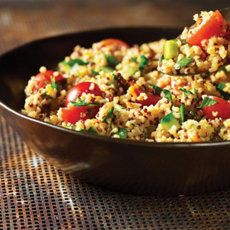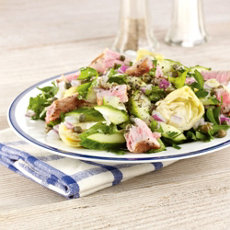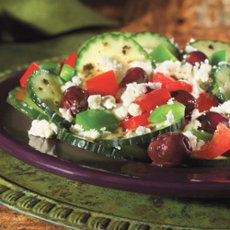- 5 Simple Substitutions
- 2-day Meal Plan
- How to Read Nutrition Facts
- Healthy Snack Ideas
- Portion Size Guide
- 6 Superfoods to Add to Your Diet
mediterranean diet FAQs
by Dr. Marc Gillinov
Dr. Marc Gillinov is the Surgical Director of the Center for Atrial Fibrillation at Cleveland Clinic. He is honored to work with the nation’s number one heart team to improve the heart health of people from around the country and around the world.
what is the best diet?
Answer: The Mediterranean diet is the best.
With thousands of books and millions of websites devoted to diet, it can be difficult to identify the “best” diet. Although optimistic claims and exuberant testimonials abound, most diets, particularly the latest fad diets, have little evidence to support their purported benefits. In 2015 USDA Dietary Guidelines and the Dietary Guidelines advisory committee named the Mediterranean dietary pattern as one of 3 dietary approaches to improving long-term health outcomes.
what are the benefits of the Mediterranean diet?
Answer: The Mediterranean diet is effective for both weight loss and for good overall health.
The Mediterranean diet focuses on fresh, unprocessed foods and includes high fiber, plant-based foods, lean meats, good fats and an optional glass of wine. It is actually a relatively high fat diet. The key here is that the fats contained in the Mediterranean diet are “good” fats. Olive oil, a key source of fat in the Mediterranean diet, is rich in monounsaturated fats that promote cardiovascular health.
what is the foundation of the Mediterranean diet?
Answer: The Mediterranean diet is based upon a broad selection of tasty, healthy, natural ingredients.
While any diet that limits calories will result in weight loss, the Mediterranean diet is better than most when it comes to helping people lose weight. Because the diet avoids simple sugars and refined carbohydrates, it tends to reduce a person’s calorie intake. In addition, strong evidence shows that healthy eating patterns, such as the Mediterranean Diet, are associated with a reduced risk of cardiovascular disease (CVD). Moderate evidence indicates that healthy eating patterns also are associated with a reduced risk of type 2 diabetes, certain types of cancers (such as colorectal and postmenopausal breast cancers), overweight, and obesity.
how do I follow the Mediterranean diet?
Answer: Use the “Divine 9” to guide your food choices.
The Divine 9 is a list of the key components of the Mediterranean diet. While we include alcohol on this list because it has long been a feature of the Mediterranean diet, alcohol consumption should be limited. In addition, people who do not consume alcohol should not start drinking simply to follow the Mediterranean diet.
| Food Group | Examples | Servings | Recipes |
Vegetables |
|
2-3 servings per day |
Pasta & Spring Vegetables
|
Legumes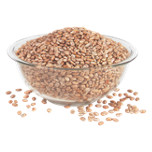 |
|
2-3 servings per week |
Crispy Roasted Garbanzo Beans
|
|
Fruits and nuts
 |
|
2-3 servings per day |
Grilled Mediterranean Stuffed Apricots

|
|
Whole grains and cereals
 |
|
2-3 servings per day |
Sweet Pepper Quinoa Tabbouleh
|
|
Fish
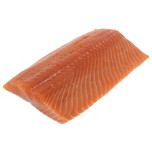 |
|
2 servingers per week |
Mediterranean Tuna Salad
|
|
Oils and fats
 |
|
1.6 to 1 ratio of unsaturated to saturated fat |
Roasted Eggplant Pasta
|
|
Dairy
 |
|
1 cup of milk or 3/4 cup of cheese per day |
Greek Artichoke Salad with Mozzarella Cheese
|
|
Meats
 |
|
1 serving per day, max
A serving is the size of a deck of cards
|
Greek Spiced Chicken Burger
|
|
Alcohol
 |
|
Men may have 1-2 drinks per day and women a single drink per day.
Those who do not drink already should not start drinking |
|
is there a "best" way to follow this diet?
Answer: Yes. The combination of mindful eating and the right foods will ensure that you achieve a healthy weight and good health.
The Mediterranean diet is one of the best diets for your overall health, but it’s not just what you eat that matters: how you eat counts as well. Many of us rush to eat quickly and do so while distracted by television, computer screens, emails or telephone calls. People who focus on eating more slowly and who pay attention to their food—savoring the taste and texture—tend to eat less and consume fewer calories. We call this approach “mindful eating.” It takes our brains twenty minutes to register that we are full. If you can carve out a half hour to enjoy your tasty, Mediterranean meal, you are more likely to eat the right amounts, enabling you to maintain a healthy weight and promote good health.
mediterranean diet pyramid
The Mediterranean Pyramid is more detailed than the USDA version of how to group foods together, and it shows us how we can select foods in proportion to give us the nutrients we need.
It also shows more emphasis on the selections at the base and fewer choices from the tip of the pyramid. The pyramid also calls attention to the fact that activity is at the base of a healthy lifestyle. Water consumption is also noted as important; and if alcohol is consumed, it should be occasional, similar to other foods higher in the pyramid, such as sources of saturated fats and sugary sweets.
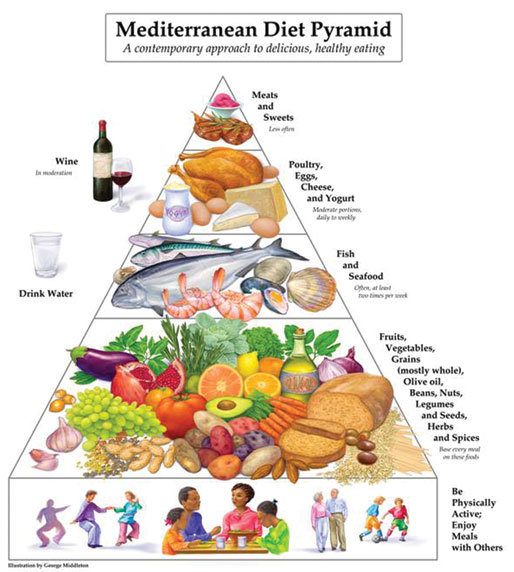
© Oldways Preservation and Exchange Trust • www.oldwayspt.org



